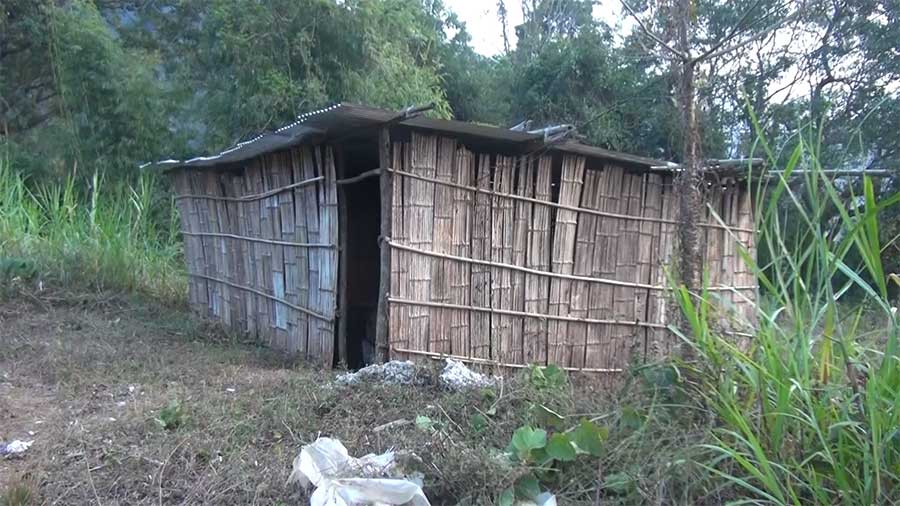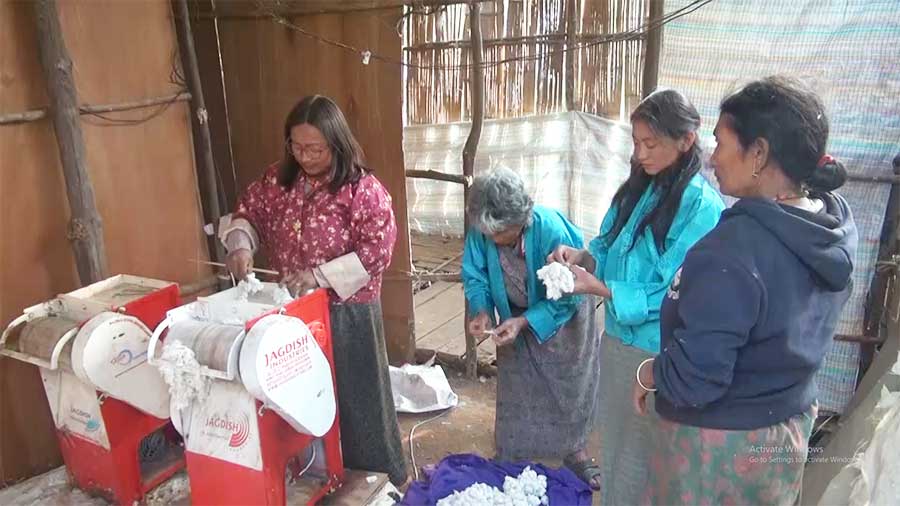
A group of cotton yarn makers in Dungmin Gewog’s Bangyul village in Pema Gatshel resumed cotton yarn production recently after getting ginning and carding machines. The new machines have helped the group accelerate their production process. However, single phase power supply is not enough to run the machines at full capacity. The Bangyul Kapa Detshen now wants three-phase power supply like other commercial and industrial facilities. Lack of a proper production house is another struggle.
 Bangyul Kapa Detshen’s production house is a makeshift hut. The group saved some amount to construct this shed. It is dusty inside and there is not a lot of space.
Bangyul Kapa Detshen’s production house is a makeshift hut. The group saved some amount to construct this shed. It is dusty inside and there is not a lot of space.
Tashi Choden, the chairperson of Bangyul Kapa Detshen says it is difficult working in the shed as the flooring is made of mud and it is dusty. “Wind enters the room with machines. We want to construct a better shed but we don’t have the budget. Our savings were spent to buy the CGI sheets and plywood.”
“It is very uncomfortable to work in this shed with dust and other elements. This leads to us being unproductive. Our friends are not happy too. If the flooring is concrete, we can collect the cotton if it falls on the floor. With mud flooring, the cotton goes to waste as it gets mixed with dust,” said Ugyen Seldon, a member of Bangyul Kapa Detshen.
According to the chairperson, the Agency for the Promotion of Indigenous Crafts agreed to fund a new shed but the budget was diverted to another district due to the pandemic. The group hopes to get a funding soon.
“I have informed the new members that we will seek support from places to have a proper plant, so that we can produce more. Right now, we are not able to meet the orders we receive. I don’t see marketing as an issue for us,” the chairperson added.
The two machines one used to separate cotton fibres from seeds and the other to make cotton fibres into yarn was given by the Agency for Promotion of Indigenous Crafts and the Tarayana Foundation in 2021.
The machines slow down when there is low voltage reducing production capacity. To avoid peak power consumption periods, the group runs the machines during off hours.
The chairperson further added that as the carding machine requires three-phase power supply, they carry out the works at night, after villagers finish preparing their meals. “And if it is in the morning, we do it between 9am and 10am. If the machine is running at the time of preparing meals, voltage is not high enough to run the machine at full capacity.”
Ugyen Seldon, the member of the group said, “we hesitate, while working at night, thinking we might disturb our neighbors. But we don’t have any option. We have already started this work. So, we are trying our best to make it a successful one.”
According to the Dungmin Gewog administration, the cotton yarn production unit is important to enhance the socioeconomic development in the locality and to preserve the village’s tradition.
However, the Gewog did not receive any request from the group for a three-phase power supply. The Gewog says they want to support the group.
“If they approach to the Gewog administration, we can ask for support. We will take this issue to the Dzongkhag administration and we even have the Economic Development and Marketing officer. So, we will solve this issue soon,” said Dungmin Gup Choki Thinley.
The group had approached the Bhutan Power Corporation and the Gewog office during the tenure of the second local government.
The group has 12 registered members today.
Thinley Dorji, Pema Gatshel
Edited by Sherub Dorji








